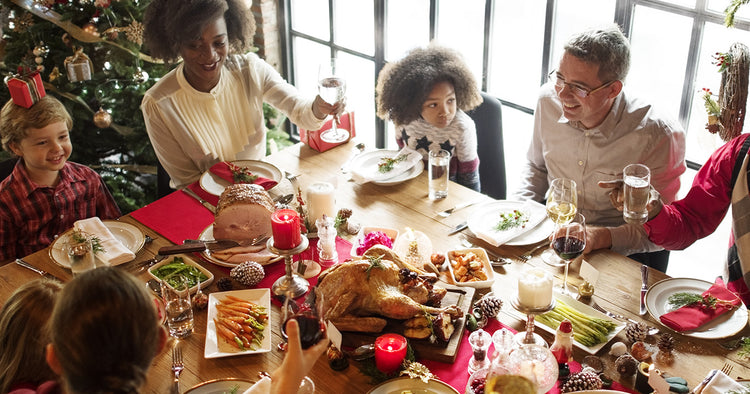Ah, the holidays. Crisp air, cozy blankets, the smell of cinnamon and pine, time with family and loved ones, and all the yummy foods. You are probably already experiencing some sort of reaction to thinking about holiday treats – so take a second to notice what is happening in your mind and body.
Do you feel excited? Anxious? Uncomfortable? Unbothered? Everyone comes to the table (literally) with a different perspective on food consumption around the holidays, uniquely shaped by personal experience, upbringing, and cultural influences. Today, we are going to take a look at the complex topic of eating during the holiday season in hopes of reframing the stigma around indulging in holiday treats and meals.
While the exact amount of weight gain varies from person to person, most people gain some weight around the holiday season. However, you may be shocked to find it is actually not as much as you may think. A recent study found that the average U.S. adult gains approximately .4-.9 kilograms between November and January- that’s only .88-2 pounds.(1)
This conversation is a delicate dance with lots of nuance. Ultimately, it all comes back to balance. Of course, it’s unhealthy to live solely off pastries and fried food. However, I believe it is crucial to get clear on what “unhealthy” or “bad for you” even means. And here’s a quick spoiler – it’s all relative.
“Nutrient-Dense” vs “Empty Calories”
Let’s start with a quick lesson in nutrition. When you hear the terms “calories”, “carbs”, and “fat”, what is your instinctual reaction? Most people immediately associate a negative connotation with these words and view them as something to be fearful of. However, all of these terms are inherently neutral and are simply forms of energy for our bodies. It is all relative to the quantities and the quality of calories, carbohydrates, and fats consumed that will elicit a given response.
There are foods that are considered nutrient-dense and foods that are primarily made up of empty calories. Nutrient-dense foods are just as the name would suggest – foods that are dense in nutrients and tend to be low in calories relative to the mass of the food. These act as a good source of energy to keep you feeling fueled and energized – think chicken, salmon, pasta, rice, fruits, and vegetables.
The term “empty calories” refers to foods that are high in calories, but low in nutrients. These tend to be the main culprits of weight gain as they will not leave you feeling as fueled and energized as nutrient-dense foods do. However, these foods still contribute to your daily intake of calories. If calorie intake exceeds your Resting Metabolic Rate (the amount of calories your body burns at rest) combined with calories burned from activity, weight gain will occur. A few examples of foods with empty calories are cookies, brownies, and most fried foods.
In simple terms, food is fuel. Some foods will be a more adequate source of fuel than others, and it is okay from time to time to consume more of the latter. No matter what you eat, if you consistently eat more calories than your body can burn in a day, then yes, you will gain weight. But that’s not necessarily a bad thing! Just like the weather, life has seasons, and it’s okay for your fitness journey to have ebbs and flows. In fact, there can even be benefits to weighing more at certain points of the year.(2)
Here Are 5 Tips for Approaching the Dinner Table This Holiday Season
1. Aim for at Least 3-4 Nutrient-Dense Foods on Your Plate
Many of the traditional holiday foods are actually healthier than you may think. When it comes time to dish up, try to take a serving of protein (turkey, ham, lentils, tofu), vegetables (green beans, carrots, brussels sprouts), carbohydrates (mashed potatoes, bread), and if available, a fruit or other plant source (cranberries, squash). If you are unsure if any of these options will be available, start the conversation well ahead of the holiday so you feel at ease the day of. If someone else is hosting and you feel uneasy about the offerings, offer to bring a nutrient-dense option or two! Better yet, offer to host the holiday meal yourself to ensure quality and delicious cuisine. If neither of these options are possible, don’t panic. Just do the best you can with what you have. Again, one day of increased empty calorie intake will do less harm than you realize.
2. Start With Small Portions
You can always go back for seconds! Starting with small portions is a great way to ensure you won’t over-consume and helps to reduce food waste. Often, we may feel full, but still feel the need to consume everything on our plate to the point of feeling sick. Starting with a small serving is also a great way to ensure you are able to try all of the delicious foods being served – there is nothing more disappointing than being too full to enjoy a dish you were excited to try!
3. Take Your Time
Try to eat slowly and listen to your body’s cues as you are eating. This will also allow you to truly savor the flavors – someone spent a lot of time, effort, and care to prepare what you are tasting, so give yourself some time to truly take it all in. It also takes your brain some time to catch up and fully process the state of your body. You may get halfway through your serving and realize that even though there is food left, you are actually full. This gives you an opportunity to stop eating, or at least take a pause, before you get to the point of nausea and discomfort. Finding your mind-body connection while eating is an amazing skill to tap into all year round as well.
4. Stay Active!
Of course, it's called a “holiday” for a reason, and if you feel that you need to take the day as a break from your normal fitness routine, please allow yourself to do that, guilt-free. If you would like, consider taking a walk to help aid digestion and get some light movement in after your holiday meal. This can also be a great way to spend time with family, take in nature, and connect together through movement and a shared experience. If you’re feeling extra ambitious the next day, your body will be fueled remarkably to partake in strength training, running, and other forms of fitness. However, do not do this out of a place of punishment for enjoying yourself the day before. Rather, try to focus on how strong and powerful you feel thanks to your hearty meal the day prior.
5. Relax
One day of enjoying yourself isn’t going to throw you off track. As a general rule of thumb, one pound of body weight is equivalent to 3,500 calories. That means you would need to eat 3,500 calories in excess of your Resting Metabolic Rate and calories burned from activity and movement to put on a pound of weight. In most cases, it takes multiple days of eating in a caloric surplus for a substantial and lasting change to occur in your body composition.(3) So, take a deep breath, and allow yourself to mindfully enjoy your favorite foods and treats.
Finally...
If you only take one thing away from this article, let this be it this: you do not have to do anything to “earn” or “burn off” your favorite holiday foods. Food is culture, memories, and shared experiences. It is, or at least should be, SO much more than numbers that go into a tracker and haunt you all day every day. So please, enjoy the moments, memories, and flavors of this holiday season.
1. Fahey, M. C., Klesges, R. C., Kocak, M., Talcott, G. W., & Krukowski, R. A. (2019). Seasonal fluctuations in weight and self-weighing behavior among adults in a behavioral weight loss intervention. Eating and Weight Disorders - Studies on Anorexia, Bulimia and Obesity, 25(4), 921–928. https://doi.org/10.1007/s40519-019-00707-7. Accessed 10 November 2023.
2. Byrne, N. M., Sainsbury, A., King, N. A., Hills, A. P., & Wood, R. E. (2017). Intermittent energy restriction improves weight loss efficiency in obese men: The matador study. International Journal of Obesity, 42(2), 129–138. https://doi.org/10.1038/ijo.2017.206. Accessed 10 November 2023.
3. Emmie Satrazemis, R. (2023, May 5). How much weight can you gain in a day?. The #1 Performance Meal Delivery Service. https://www.trifectanutrition.com/blog/how-much-weight-can-you-gain-in-a-day#:~:text=Traditional%20wisdom%20claims%20it%20takes,to%20increase%20body%20fat%20storage. Accessed 10 November 2023.
























Add Your Name & Email
Please enter your name and email to continue.We won’t display your email publicly.